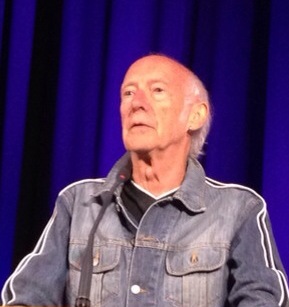A Quote by Roger McGough
Everyday I think about dying About disease, starvation, violence, terrorism, war, the end of the world. It helps keep my mind off things.
Related Quotes
When a significant other - a spouse, a parent or someone you're close to - is dying, it forces you to think about your life, about what you feel about death. What I realized from my dad's dying was that I wasn't scared of dying. But I was terrified of regrets. I was terrified of getting to the end of my life with a lot of Why didn't I's.
Part of what my work has always been about is to show that the apocalyptic character of the gospel makes the everyday possible. It gives us the time that lets us care for one another as we are ill, helps us care for one another as we experience broken relationships, and helps us take the time to worship God in a world of such violence.
You can't think about terrorism without thinking about Palestinian terrorism. Palestinians began international terrorism. It started with them in 1968. They used it as the first resort, not the last resort. They invented it, they perfected it, they benefited from it and they taught the world how to use it and that it would be successful.
People still think of AIDS as a shame-based disease, it's a sexually transmitted disease, and you're either gay or you're a prostitute or an intravenous drug user. And so a lot of people are still very bigoted about this disease. It's such a treatable disease. It's so - the end is in sight for this disease, medically.
I think that of all the diseases in the world, the disease that all humankind suffers from, the disease that is most devastating to us is not AIDS, it's not gluttony, it's not cancer, it's not any of those things. It is the disease that comes about because we live in ignorance of the wealth of love that God has for us.
There’s only one Earth, and it’s tiny, but evil human leaders avoid problems they don’t want to resolve by giving them names which make the problems sound like they’re taking place in a different world: they make people not care about other people dying of starvation by calling the place the dying live “the third world.
I'm really interested in violence. And I think there's an inevitably cinematic property that violence brings to the moviegoing experience. But one still has to be thoughtful and mature about how you depict it and how you think it through. You have to think about the effects that violence has on audiences, and it's deployed so casually that I think it's losing its meaning. And when things like violence and murder and the dehumanization of other people lose their meaning, then we're really kind of in a place where we have to reexamine and take a hard look at ourselves.
And in the end, of course, a true war story is never about war. It's about sunlight. It's about the special way that dawn spreads out on a river when you know you must cross the river and march into the mountains and do things you are afraid to do. It's about love and memory. It's about sorrow. It's about sisters who never write back and people who never listen.
I generally avoid over-population arguments. But there's no question we're in population overshoot. The catch is we're not going to do anything about it. There will be no policy. The usual suspects: starvation, war, disease, will drive the population down. There's little more to say about that really, and it's certainly an unappetizing discussion, but it's probably the truth. In any case, we're in overshoot and we face vast resource scarcities.







































